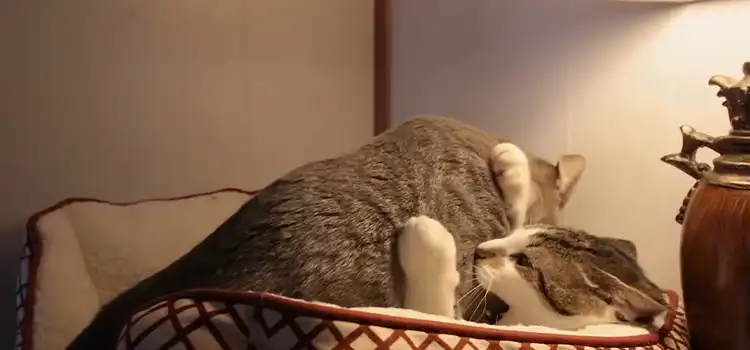One of the joys of having a mother cat with kittens is getting to observe the special bond between momma and her babies. However, some cat parents are puzzled when they notice mother felines occasionally hissing or swiping at their own kittens. Why would a devoted cat mom behave aggressively towards her own son?
Mother cats may hiss at their male offspring as a disciplinary behavior or reaction to rough play. It also establishes boundaries as kittens mature and become more independent. But there’s more to learn about this intriguing behavior.
If you’re curious about your mother cat’s occasional hissing at her son and want to gain a better understanding of this behavior, you’re in for a feline family adventure. We’ll explore the reasons behind mother cat hissing, how it benefits the kittens, and how to ensure a harmonious family atmosphere. Let’s explore the reason below.

Reasons Why Mother Cat Hisses at Her Son
While often normal, hissing sometimes indicates problems that warrant attention:
- Medical Issues: Illness, pain, mammary infections, or post-pregnancy hormone fluctuations can cause irritability.
- Litter Size: Moms of large litters can become overwhelmed and irritated by demands of numerous kittens.
- Anxiety: Stress from inadequate space, food, cleanliness, or human interference can make mother cats lash out.
- Lack of Socialization: Unsocialized mother cats may not understand proper nurturing behaviors and turn to aggression.
If hissing seems excessive or kittens show signs of injury or anxiety, contact your veterinarian for an evaluation.
When Hissing is Normal
As long as kittens seem unbothered and mother cats show continued affection, occasional hissing is no cause for worry. Signs it’s within the range of normal behavior include:
- Only hissing during roughhousing or discipline.
- Kittens immediately return to nursing and cuddling.
- No signs of wounds, anxiety, or avoidance behaviors.
- Mother cat regularly grooms and interacts affectionately.
- Hissing decreases as kittens mature.
Natural Mothering Behaviors of Cats
Hissing may seem contrary to nurturing mothering behaviors, but in the cat world it serves several natural purposes:
- Establishing Dominance
Mother cats use hissing to establish their continued dominance over kittens as they grow, especially rambunctious young toms.
- Discipline During Play
Hissing communicates acceptable boundaries for rough play or misbehaving. It teaches kittens proper social manners.
- Weaning Guidance
As kittens mature, hissing guides their transition to independence, teaching them not to overstep boundaries with their mom.
- Preparing for Separation
The maternal bond begins naturally weakening over time. Hissing helps ease this transition as kittens ultimately separate from their mother.
Supporting Healthy Behavior
Cat owners can encourage healthy mother-kitten bonds through:
Providing Proper Space: Ensure mother cats have an appropriately sized, low-traffic area with hiding spots for her and kittens.
Limiting Stress: Gently handle kittens and give mother cats alone time. Avoid introducing new pets or people.
Offering Resources: Provide ample food, water, litter boxes, warmth, and nesting materials to reduce maternal stress.
Arranging Vet Checks: Schedule wellness exams for mother cats before and after birth to address any concerns.
Takeaways
The world of feline family dynamics is both fascinating and complex. When a mother cat hisses at her son, it’s often a part of the intricate process of teaching boundaries, life skills, and independence. By understanding and respecting these dynamics, you can ensure a harmonious and nurturing environment for the entire feline family. If you have more questions about your cat’s behavior or feline family dynamics, please feel free to leave a comment below. Thank you for reading, and here’s to fostering a loving and understanding feline family!
Questions & Answers
- Why Does My Cat Only Hiss At One Kitten?
Singling out one kitten for hissing likely indicates that particular kitten is more unruly or independent. As long as the kitten isn’t treated aggressively overall, some targeted discipline is normal. Monitor for signs of actual hostility or distress.
- How Long Will A Mother Cat Hiss At Her Kittens?
Mother cats should decrease hissing as kittens mature, completely stopping by the time they fully wean and separate around 8-12 weeks old. If aggressive hissing continues much beyond weaning, a vet visit is advisable.
- When Should I Separate Kittens If Mom Is Hissing?
If mother’s hissing seems excessive, leads to injuries, or kittens show signs of anxiety or avoidance, separating may be needed for wellbeing. Generally kittens can stay with mom unless the situation appears harmful.
- Why Does My Cat Hiss At One Kitten After Nursing?
Some kittens are more eager nursers and may overstep boundaries. A hiss after nursing establishes control and boundaries. Unless the kitten seems distressed or underfed, this is usually normal. Just monitor the situation.
- Why Is My Male Cat Hissing At His Kittens?
While less common, some father cats also discipline kittens. Since males are not driven by maternal instincts, hissing may indicate a lack of tolerance for rambunctious kittens and a need for separation.
